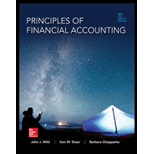
Concept explainers
1.
Identify the maturity date for each of the three notes described.
1.
Explanation of Solution
Notes payable:
Notes Payable is a written promise to pay a certain amount on a future date, with certain percentage of interest. Companies use to issue notes payable to meet short-term financing needs.
Maturity date:
The date on which the borrower should pay the principal amount of loan, or bond, is referred to as maturity date.
| Particulars | Company L | Bank NBR | Bank F |
| Date of note | 19th May | 8th July | 28th November |
| Terms of the note ( in days) | 90 | 120 | 60 |
| Maturity date | 17th August | 5th November | 27th January |
(Table 1)
2.
Identify the interest due at maturity for each of the three notes.
2.
Explanation of Solution
Calculate the interest due at maturity for the note bearing an amount of $35,000.
Therefore, the interest due at maturity for the note bearing an amount of $35,000 is $875.
Calculate the interest due at maturity for the note bearing an amount of $80,000.
Therefore, the interest due at maturity for the note bearing an amount of $80,000 is $2,400.
Calculate the interest due at maturity for the note bearing an amount of $42,000.
Therefore, the interest due at maturity for the note bearing an amount of $42,000 is $560.
3.
Identify the interest expense to be recorded in the
3.
Explanation of Solution
Therefore, the interest expense recorded in the adjusting entry at the end of 2014 is $308.
4.
Identify the interest expense to be recorded in 2015.
4.
Explanation of Solution
Therefore, the interest expense recorded in 2015 is $252.
Prepare
Explanation of Solution
| Date | Account title and Explanation | Debit in $ | Credit in $ |
| April 20, 2014 | Merchandise inventory | 40,250 | |
| Accounts payable to Company L | 40,250 | ||
| (To record the purchase of merchandise on credit) | |||
| May 19 | Accounts payable to Company L | 40,250 | |
| Cash | 5,250 | ||
| Notes payable-Company L | 35,000 | ||
| (Paid $5,250 cash and gave a 90-day, 10% note to extend due date on account) | |||
| July 8 | Cash | 80,000 | |
| Notes payable –Bank NBR | 80,000 | ||
| (Borrowed cash with a 120-day, 9% note.) | |||
| August 17 | Interest expense | 875 | |
| Notes payable –Company L | 35,000 | ||
| Cash | 35,875 | ||
| (Paid note with interest.) | |||
| November 5 | Interest expense | 2,400 | |
| Notes payable –Bank NBR | 80,000 | ||
| Cash | 82,400 | ||
| (Paid note with interest.) | |||
| November 28 | Cash | 42,000 | |
| Notes payable –Bank F | 42,000 | ||
| (Borrowed cash with 60-day, 8% note.) | |||
| December 31 | Interest expense | 308 | |
| Interest payable | 308 | ||
| (Accrued interest on note payable.) | |||
| January 27, 2015 | Interest expense | 252 | |
| Notes payable- Bank F | 42,000 | ||
| Interest payable | 308 | ||
| Cash | 42,560 | ||
| (Paid note with interest.) |
(Table 2)
Want to see more full solutions like this?
Chapter 11 Solutions
Principles of Financial Accounting.
- Please provide the answer to this general accounting question using the right approach.arrow_forwardI am looking for the correct answer to this general accounting problem using valid accounting standards.arrow_forwardCan you solve this general accounting problem with appropriate steps and explanations?arrow_forward
- (1) prepare the december 31 entry for bramble corporation to record amortization of intangibles. the trademark has an estimated useful life of 4 years with a residual value of $3,520 [it is not $3,460]arrow_forwardPlease provide the solution to this general accounting question with accurate financial calculations.arrow_forwardI need help with this general accounting question using standard accounting techniques.arrow_forward

 AccountingAccountingISBN:9781337272094Author:WARREN, Carl S., Reeve, James M., Duchac, Jonathan E.Publisher:Cengage Learning,
AccountingAccountingISBN:9781337272094Author:WARREN, Carl S., Reeve, James M., Duchac, Jonathan E.Publisher:Cengage Learning, Accounting Information SystemsAccountingISBN:9781337619202Author:Hall, James A.Publisher:Cengage Learning,
Accounting Information SystemsAccountingISBN:9781337619202Author:Hall, James A.Publisher:Cengage Learning, Horngren's Cost Accounting: A Managerial Emphasis...AccountingISBN:9780134475585Author:Srikant M. Datar, Madhav V. RajanPublisher:PEARSON
Horngren's Cost Accounting: A Managerial Emphasis...AccountingISBN:9780134475585Author:Srikant M. Datar, Madhav V. RajanPublisher:PEARSON Intermediate AccountingAccountingISBN:9781259722660Author:J. David Spiceland, Mark W. Nelson, Wayne M ThomasPublisher:McGraw-Hill Education
Intermediate AccountingAccountingISBN:9781259722660Author:J. David Spiceland, Mark W. Nelson, Wayne M ThomasPublisher:McGraw-Hill Education Financial and Managerial AccountingAccountingISBN:9781259726705Author:John J Wild, Ken W. Shaw, Barbara Chiappetta Fundamental Accounting PrinciplesPublisher:McGraw-Hill Education
Financial and Managerial AccountingAccountingISBN:9781259726705Author:John J Wild, Ken W. Shaw, Barbara Chiappetta Fundamental Accounting PrinciplesPublisher:McGraw-Hill Education





